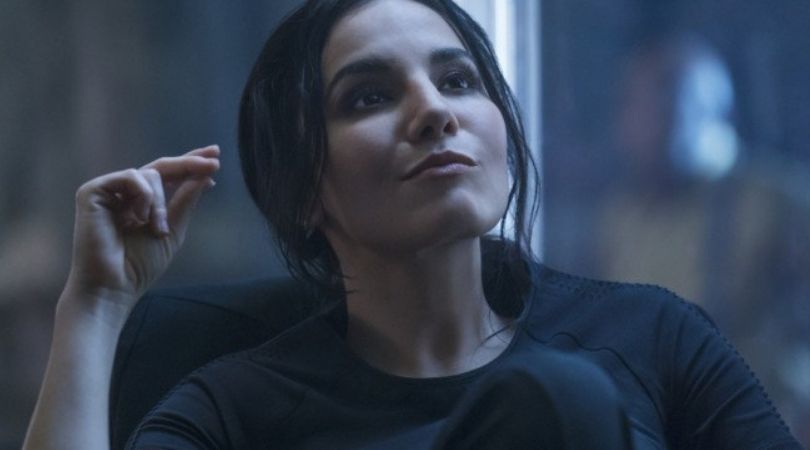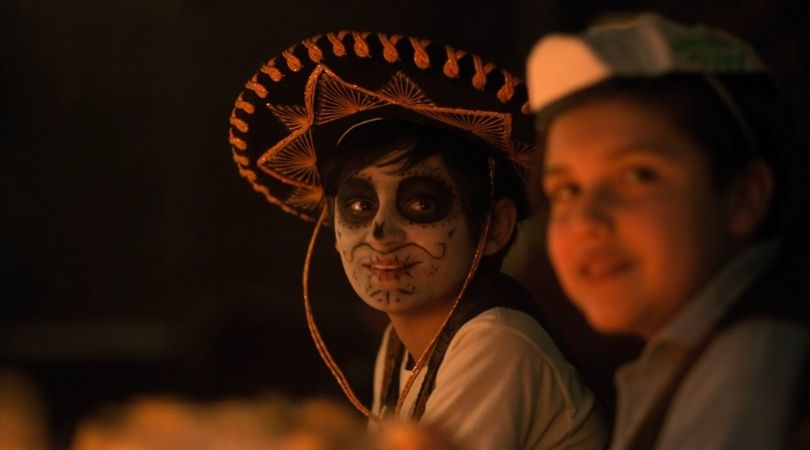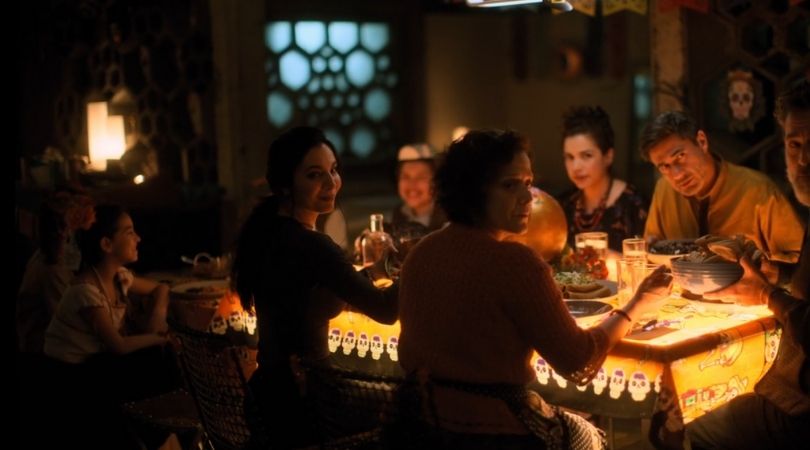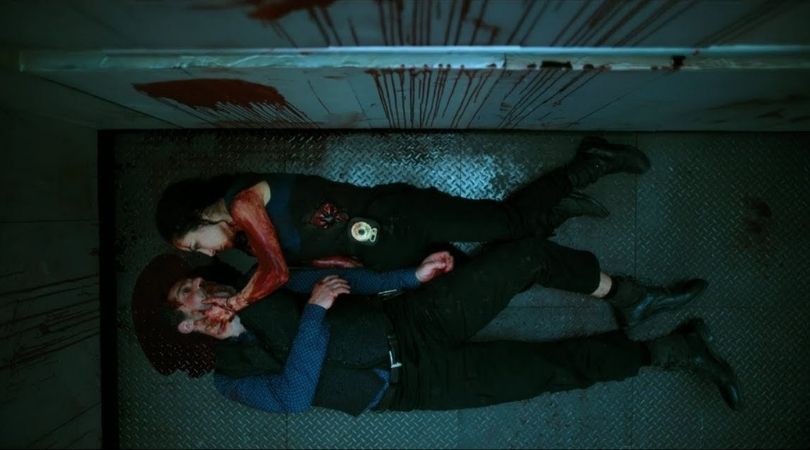
Altered Carbon has been out for some time now and I haven’t been able to shake how much it resonated with me. The series is a Netflix Original set in a dystopian future where the discovery of alien tech has made the human mind all but immortal, while the body is no more than a sleeve to be slipped out of upon corporeal death and into another one – if you have the money and aren’t restricted by Neo-Catholic ideology. The main character is Takeshi Kovacs, a criminal awoken from deep sleep and dropped into a new body. Although the main story is his and his journey from a peace-keeper, to rebel, to a hired investigator, Detective Kristin Ortega ‘s story in the series is one that resonates with me and builds out one of the best Latina characters written in science fiction.
From the get-go, Kristin Ortega, played by Mexican actress Martha Higareda, is a no-nonsense officer who not only ends up being one of the most capable fighters in the series but also has an episode exploring the religiosity and family dynamics of the Mexican Ortega family. I can go into detail about her connection with Kovacs but that isn’t where the character’s strength lies. In fact, it’s her tenacity and family conversations that hit home for me, as a Mexican-American science fiction lover. I want to talk about the ways that Det. Ortega became a character that I care about but I also want you to watch the series and see yourself in her without my input. So instead, here is a list of four ways that I see my own latinidad in her character.
Language

Altered Carbon is a future where different languages and dialects don’t matter nearly as much as personal connections between people, that is to say, everyone in the world seems to understand each other even when speaking languages outside of the other person’s culture. In a world where the outside means nothing and the mind means everything, the emphasis on cultural specificity in character interactions was unexpected and well done.
With multiple characters shown shifting seamlessly between one language and the next and the people around them not skipping a beat or explaining that they don’t understand, language is easily one of my favorite parts of the show. For Kristin Ortega, this means having conversations with her mother in Spanish then switching to English to the people around her. Beyond just speaking her family’s language with them, Ortega is a character that has a thick accent and routinely expresses herself in Spanglish while she is moving through the world. Ortega uses Spanish to emphasize her emotions while speaking English with characters outside her family in the series and while being played by a Mexican actress, it makes the character grounded, unique, and unashamed of herself.
Personally, I never learned Spanish fluently because my mother was scared of me having an accent while also being a brown woman – the topic of another story. That being said, because of how my family’s background and myself being one of the few who didn’t speak Spanish as a first language, there are some words I will always say in Spanish. Ortega’s script reflects the reality for many Mexican Americans, switching languages from private to public, speaking in one language and feeling in another, and ultimately a life full of code-switching.
For a science fiction show set 300+ years in the future showcasing the different times and situations people use varying languages is relevant to Latinx communities and it isn’t forced. Ortega use of Spanish never seems out of place to the characters around her, a level of acceptance we still don’t have, even in the Southwest.
Dia de Muertos

In episode four, “Force of Evil,” we explore the world of Altered Carbon on All Hallows Eve, a night where all traditions celebrated around death are blended into one because of the blended society of the protectorate. But it is also a day where each culture in the protectorate celebrates their own relevant day. In the show, Kristin Ortega is of Mexican descent and the episode’s heart is around her and her family’s celebration of the Dia de Muertos, Day of the Dead.
Dia de Muertos is a multi-day holiday that focuses on gatherings of family and friends to pray for and remember friends and family members who have died and is often used as an important outlet for grief and recovery in Mexican families. It is also rarely portrayed in pop culture as distinct from American Halloween or highlighted to show it’s importance to Mexican culture and is instead used as costumes because of the ornate Calaveras (sugar skulls) used in the celebration. In a world where all holidays are wrapped into one, the celebration of Dia de Muertos by the Ortega family is one of the most faithful I have ever seen on screen, even when it had every excuse not to be.
The family gathers together, eats, and talks about those who have passed. It’s a time of prayer and celebration but also a time to talk about the complexities being able to return from the dead for real means to a holiday where spirits of your loved ones enter your home to dine with you. By choosing to highlight the holiday, the show also gives Kristin Ortega a background beyond just Latina. One of my griefs with portrayals of Latinas in pop culture is that they are rarely given a specific culture to be grounded in, instead opting for a pan-latin background. However, being a Latina means many things and depending on your specific background, your experience is different. Colombian, Dominican, Puerto Rican, and Mexican may all be considered Latinx but their cultures are distinct.
Dia de Muertos and the complexities of the holiday in a world almost without death leads to the next topic.
The Ortega Family & Religion

In the same episode mentioned above, the Ortega family discusses the importance of one life, sins, and ultimately their reliance on religion and how this new world complicates it. In a feat of world-building, Altered Carbon highlights how different cultural groups may interact with a world of immortality based on both race and class. While Ortega’s position is pro-being brought back, if even for a moment to identify your killer, her family is staunchly against it. In the show, religion is coded into your stack (the chip that holds your soul/consciousness) and those who follow Neo-Catholicism are not allowed to be “spun back up.” This means they cannot be downloaded into a new body lest they want to be barred from entering Heaven. In this world, religious views of death are confronted with new life and Ortega’s Mexican family is the perfect place to do explore it.
In my own life, Mexican American cultural experiences have been highly dependent on religion and specifically Catholicism. Our cultural traditions and holidays are by and large the products of Catholics colonizing indigenous people and those victims merging their beliefs with the new religion to maintain them. It’s because of this that navigating latinidad while atheist is extremely isolating and often leads to fights at the dinner table, much like the one Kristin Ortega has with her family. Missing her grandmother, Ortega slips her into the sleeve of a thug and brings her home to dinner. The reality of dining with the dead brings how the spiritual holiday can be turned corporal if only family members let it happen. Instead of spirits visiting your ofrendas (alters) you can have your loved ones there with you.
Although it isn’t stated, Ortega’s reluctance to back down from her families critiques of secular life led me to view Ortega as an atheist or in the very least agnostic. Leading her to partake in familial religious events out of necessity but using them to her end and outside religious significance. With the focus on Dia de Muertos, she reminded of myself celebrating the holiday, absent of religion and focused only on memories and processing my grief.
Although the family gets to see Abuela again, the older Ortegas are not nearly as amused or relieved as the children at the table. Instead, they continually condemn Ortega’s actions and talk about the sin of multiple lives and how she has doomed Abuela’s soul. This type of argument and the disappointment in her family throws at her is something I know all too well. As a Latina atheist, my community often shuns me and my own family has either explicitly cut me off or in the case of my mother, strongly prays for my soul while disagreeing with almost all my un-Catholic decisions.
My experience as Mexican American who has turned my back on religion makes my relationship with my culture complicated and in some cases inaccessible. Seeing the Ortega family bicker and question each other speaks to me on a level I haven’t found in other shows. The connection she maintains with her mother in spite of their disagreements is one my own mother and I work at every day.
Determination

In most popular media Latinas are hypersexualized and defined by their relationships with men. Although Det. Ortega’s relationship with Kovacs is an important part of her story, the determination she shows outside of that relationship in her own personal struggles and her unrelenting survival is what makes the biggest impact as a character. Ortega is put through trauma in this series: near-death experiences, amputation, and the murder of her family.
Yet, from each moment she never falters. Instead, she fights through the pain. This isn’t a particularly Latina characteristic, but the tenacity she shows by continually getting up when knocked down is important in a world where you’re underestimated and counted out before you even begin. When she is attacked in an elevator, she keeps fighting, through blood loss and pain Ortega doesn’t give up until her body can’t take anymore.
When she is given a bionic arm to replace the one she loses in the aforementioned fight, she uses it to take control and punish those involved in the corruption which led to the attack on her and the death of her partner. When her family is murdered by the man who maimed her, she is stuck in a virtual loop of finding their bodies over and over. But this doesn’t break her. Instead, when the moment to take her revenge comes she fights and wins and kills her demon with his own weapon. If ever there was an embodiment of getting back up again, it’s Kristin Ortega.
Detective Kristin Ortega is a character that highlights parts of my personality and culture that I haven’t found in most sitcoms or drama series, let alone in science fiction. Every interaction Ortega has is because of her experiences and she exemplifies how I articulate my own latinidad – or cultural experience. In addition to this, Latinx representation on screen is abysmal.
When it comes to screen roles, we only make up 3.1% even though we represent the largest minority group in the country. When it comes to science fiction, Latinas have been getting more work in 2018, and this year seems to be a great move in the right direction. However, as a life-long science fiction fan and ultimately genre fan, it’s rare that I get to see representations of Latinas be as well-rounded or culturally grounded as Kristin Ortega if they’re even there.
She is one of the main characters with agency, tenacity, and compassion. All of which are molded by her latinidad. I hope that other science fiction shows will see how easy it is to lean into cultural backgrounds and see the weight and emotion they can bring to a story.






